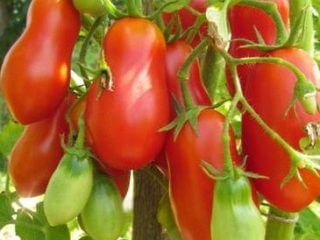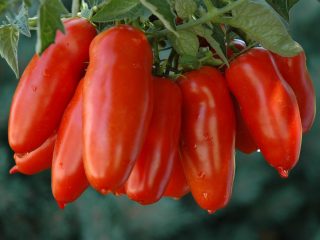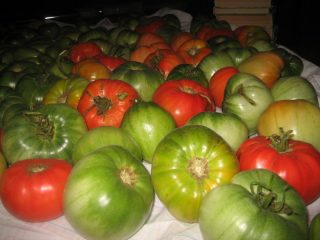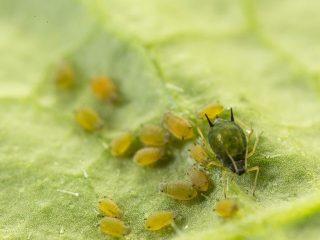Content
Pink Banana tomato is an early ripening hybrid of Russian selection, suitable for professional and home cultivation. It is characterized by resistance to cracking and major diseases and is valued for its tasty, sugary fruits.
History of selection
Available sources do not contain accurate information about the origin of the variety. It is known that it was bred by Russian breeders and successfully passed all the necessary tests.
Description and characteristics of the tomato variety Banana pink
The plant is a tall indeterminate bush. Its powerful, strong shoots stretch up to 2 m and are covered with large oblong pointed leaves, painted in a matte green shade. The plates have pronounced ribbing along the edges and a slight edge.

Among the tomatoes of the Banana pink variety, there are also lower bushes about 90 cm high
The flowers are bisexual, pollination is autogamy (independent).The first ovary appears in the area of the eighth leaf, the subsequent ones - every two plates.
Tomatoes of the Banana pink variety have an oblong pepper-shaped shape with a characteristic rounding at the tip and weigh 80-150 g. The fruits are covered with a smooth, elastic, dense skin, under which lies a sugary, slightly watery pulp. The latter is characterized by medium juiciness and has a noticeable tomato taste.
When it ripens
Pink Banana tomato is classified as an early ripening variety. It begins to bear fruit 105-110 days after the seedlings peck. The active fruiting period falls on July-September and depends on the meteorological conditions of a particular region.
Tomato yield Banana pink
The productivity of the variety depends on the growing conditions. When cultivated indoors, the average yield of the Banana pink tomato variety is 10-12 kg/m2. When grown in beds, productivity drops to 4-5 kg/m2.
Resistance to adverse factors
Pink banana is characterized by good immunity and is resistant to some “tomato” diseases. In particular, it is immune to fusarium and cladosporiosis.
Growing regions
The variety is suitable for planting in unprotected and closed ground. It can be planted in greenhouses in all regions of the Russian Federation. Pink banana tomato can be grown in beds only in regions with a favorable climate.
Methods of application
Pink banana tomatoes are valued for their versatility and pleasant sweet taste. Fragrant and juicy tomatoes are eaten dried, raw, pickled and canned. Vegetable stews and salads are prepared from them, and are also used to decorate dishes.
Advantages and disadvantages
The Pink Banana tomato is an early ripening hybrid, valued for its ease of care and resistance to typical Solanaceae diseases. It is versatile from a culinary point of view and is successfully grown in different regions of the country.

Thanks to its dense skin, the Pink Banana tomato is resistant to fruit cracking
Pros:
- good taste;
- versatility;
- good immunity;
- early ripening;
- crack resistance.
Minuses:
- need for tying.
When and how to plant
The Pink Banana tomato is grown by seedlings both in beds and in greenhouse conditions. Tomato seeds are sown from late February to mid-March. Before starting work, the seed is disinfected for half an hour in a pale pink solution of potassium permanganate, rinsed, dried and immersed in any growth stimulator for at least 30-40 minutes. Seeds treated by this method are sown in seedling boxes with drainage holes at the bottom, filled with moistened store-bought soil substrate or a homemade mixture of equal amounts of garden soil, humus and peat. The crops are sprinkled with a layer of soil maximum 20 mm thick and covered with glass to ensure a greenhouse effect.
When the first shoots hatch, they are freed from the glass shelter and moved to a cooler room.As soon as 3-4 true leaves are formed on the seedlings, they are dropped into disposable plastic cups with a volume of at least 500 ml. Subsequent care of seedlings comes down to systematic watering and fertilizing.

Tomato variety Banana pink is planted so that there are a maximum of three bushes per 1 m2
Tomato seedlings are transplanted to a permanent location after 60-65 days. To do this, choose a sunny area with fertile soil, where onions, legumes, herbs, zucchini or garlic were previously grown.
Tomato seedlings are carefully removed from the glasses, trying not to damage the integrity of the earth, and planted in pre-dug holes fertilized with any organic matter, such as manure. Finally, the tomato bushes are watered with non-cold filtered water and provided with a strong support.
Care instructions
Although the Banana pink tomato variety is considered an undemanding variety, to obtain a good harvest and better taste of the fruit, the plant needs proper care. The list of necessary agrotechnical measures for tomatoes includes:
- Moistening the soil. The soil under tomatoes is irrigated on average once a week, assessing the current condition of the soil. Watering is carried out using settled water at room temperature, which is poured exclusively at the root, avoiding drops settling on the leaves of the plants.
- Application of fertilizers. Tomatoes are fertilized at least three times per season. During the active growth phase, nitrogen-containing compounds are added to the soil to stimulate the growth of green mass. At the stage of the appearance of ovaries and at the stage of fruiting, tomato bushes are fed with potassium and phosphorus fertilizers.
- Hilling. Tomatoes usually form additional roots that have to be covered with soil.Bushes are earthed twice a season: when the rudiments of roots appear on the stems near the surface of the ground and after the lower part of the trunk turns a little blue.
- Land cultivation. After each watering, the soil under the tomatoes is loosened to ensure the supply of oxygen to the root system and to prevent stagnation of moisture, which provokes fungal infections. At the same time, in the tree trunk circle, weeds are pulled out, drawing nutrients and moisture from the soil.
- Formation of bushes. Plants form 1-2 stems, promptly getting rid of wilted leaves and drying shoots. The plates growing in the lower part of the stem are cut off gradually, a maximum of a couple of pieces at a time, so as not to cause cracking of the fruit. The leaves are removed until all specimens located under the first fruit bunch are removed.
Prevention of diseases and pests
If you believe the reviews of gardeners, the Pink Banana tomato variety is characterized by strong immunity and rarely gets sick, even if bushes of other varieties planted nearby are affected by some kind of infection. However, for the purpose of prevention, it is advisable to periodically treat plants with insecticides and fungicides (Topaz, Actellik).
Conclusion
Pink Banana tomato is a promising early-ripening hybrid variety characterized by good yield and good immunity. It is actively used in cooking and is suitable for cultivation in different regions of the country.
Reviews from gardeners about the Pink Banana tomato








